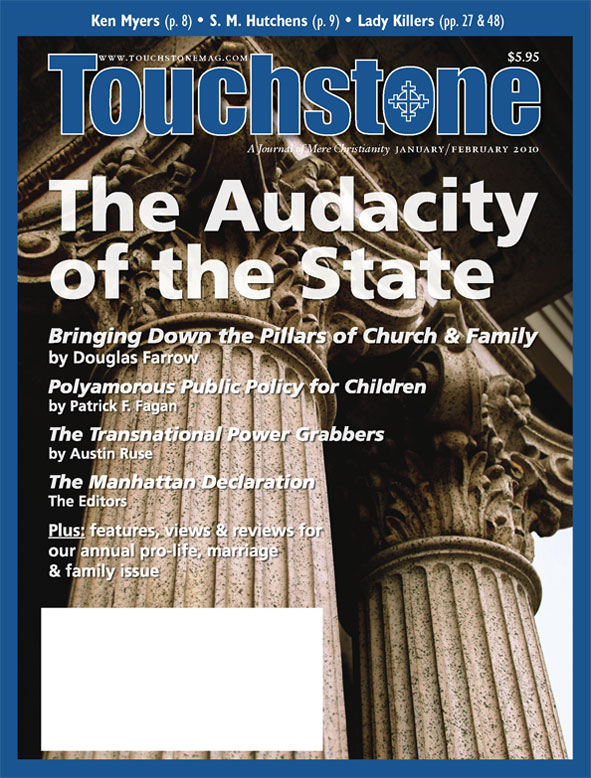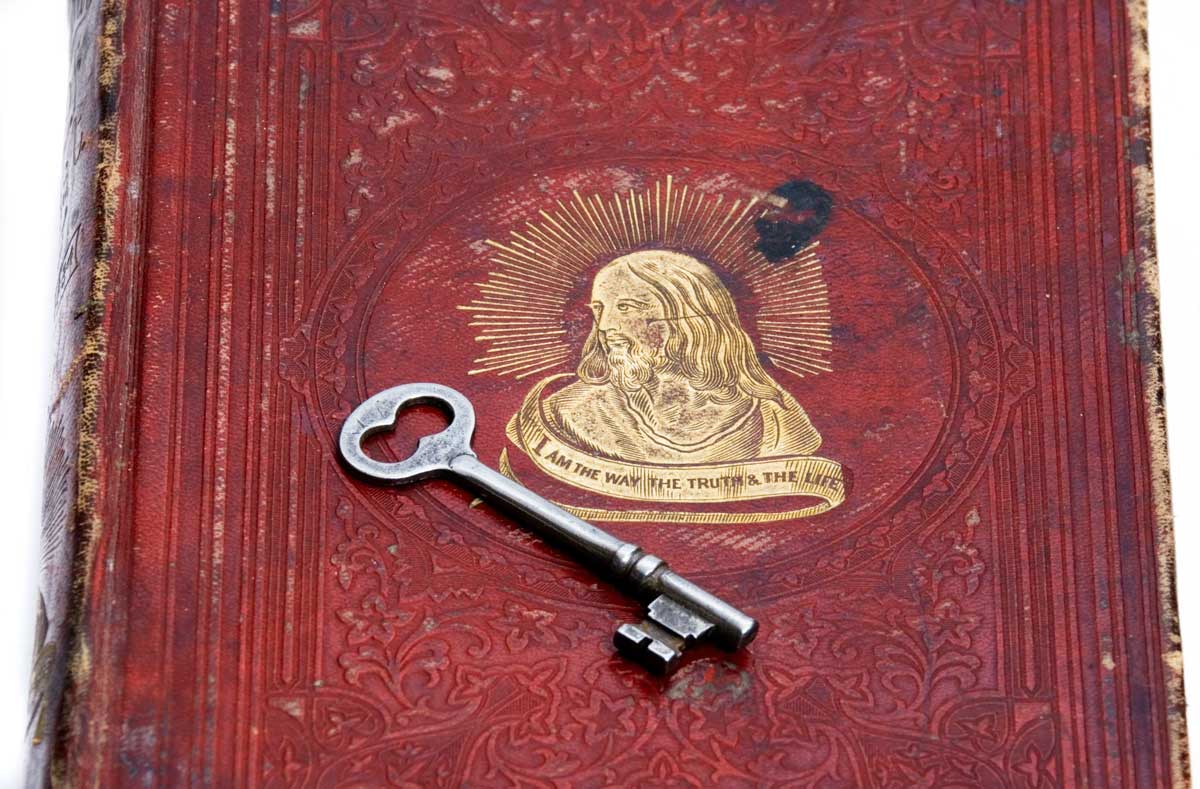Always the Trinity
S. M. Hutchens Answers a Question on Egalitarian Theology
Dear Dr. Hutchens,
I am a recent graduate of a well-known Evangelical seminary. I do not know how familiar you are with the school, but, among other things, it very strongly supports egalitarian readings of Scripture.
In the years that I have spent here, I have been subjected to a nearly continuous barrage of egalitarian propaganda. Even in classes that are otherwise unrelated to “gender issues,” such as Greek or inductive Bible study, the professors will invariably make use of examples that support egalitarian interpretations of Scripture. Yet, for all of this, I remain unconvinced. Even their best arguments are based on faulty logic or fabricated “fact.” Finding men who hold to traditional understandings of Scripture on these matters is a difficult task on this campus (I can count all those I know on one hand).
This is one of the reasons that I have enjoyed reading your articles in Touchstone. I would like to thank you for your strong stand against the current drift of the Church into feminist-inspired doctrine. I would very much like to hear more of your thoughts on the subject. Do you have any writings (other than what can be found on Touchstone’s website) that expound upon biblical understandings of men and women, as well as how this relates to God’s own nature and the structure of the Church?
I was also wondering if you could point out some specific writings by church fathers, or other great saints, that address these issues. While the Fathers are largely ignored (if not outright maligned as “dead white men”) on this campus, I still have a great respect for them but simply do not know where to start.
I thank you very much for taking the time to read this email and for the work the Lord is doing through you for his body, the Church.
— Diogenes
Dear Diogenes,
First let me commend you for holding your ground at the seminary. The kind of resolve necessary to refuse the king’s meat, whatever that might mean for future prospects, that I did not have to adopt with full intent until I was a graduate student in a liberal Protestant seminary must now be taken up by students at schools that profess Evangelical orthodoxy but want egalitarianism in the bargain—which, as you have become aware, can’t be done.
For many years your school had a reputation for providing ministers in the tradition of its confession’s founders to a church that became more decidedly modernist as time went on. Many congregations, in the attempt to maintain the earlier doctrines and practices, looked to it rather than the official denominational academies to provide them pastors, something the powers-that-be within that church resented, and thwarted when they could. There isn’t much need for them to do this any more, for the Evangelical schools are giving them much of what they want. The leaders of fallen churches can tolerate, as matters of style or preference, any number of pieties, high-church or low, charismatic or traditional, legalist or loose, as long as they are accompanied by the orthodoxy du jour.
Feminism seems to have been more than the majority of these seminaries, whatever confessional history they claim to represent, could resist—and you are right: viewed dispassionately, the whole business is absurd, for what must be done to the interpretation of Scripture and the Church’s history to accommodate egalitarian doctrine is so perverse and nonsensical that only the sort of indoctrinational methods you mention, joined with subtle, then later—when feminist power has become consolidated—not-so-subtle intimidation, suffice to stifle the voice of reason.
Those who are truest to egalitarian principles admit the ultimate impossibility of reforming a faith that is, in the words of one of them, “hopelessly patriarchal.” They have, very sensibly given their convictions, denounced Christianity and left the Church altogether.
In my view, the principal value of the church fathers in all this is simply that they are orthodox Christians where the egalitarians are not. With respect to the relations of men and women under Christ, one finds little to the modern point in their writings because they assumed the scriptural seats of doctrine on such matters to be uncomplicated and true, and did not indulge in the tortuous recasting to which you have become accustomed.
The battle of our age is our own; the labor of explicated response to the emphases of false teaching in our generation rests upon the work of our forebears, but is different. One does not go directly to the Fathers to refute the egalitarians in Evangelical seminaries. If they, with flabbergasting boldness, do what they do with Scripture, what do you imagine they will do with resonant but lesser authority, patristic or otherwise?
Battle for the Trinity
If you have read what I have written in Touchstone, you will recall that for many years I have been saying that the anthropological heresy of egalitarianism must terminate in false teaching about the Holy Trinity. The main battle has indeed met on this ground. In a brief but gravid footnote in his treatise on Gregory of Nazianzus (Oxford, 2008), Christopher Beeley notes with respect to St. Gregory’s teaching that in the Trinity dependence and equality are mutually involved in each other, and “the ecclesiological and political implications of this central point are momentous, complex, and often overlooked” (p. 210, n. 71). He chides egalitarian improvers of Trinitarian doctrine like Thomas Torrance for sensibilities that are in effect those of the ancient Eunomians.
But, just as in the fourth century, there is much theological labor to be done and much blood to be shed before the matter is worked out and the doctrine of the Church is established against learned and subtle innovation in our own. The Western theological tradition on the relations of the divine Persons, founded in Augustine, and cleanly traceable through Aquinas and Calvin, has been reticent to deal with “dependence in the Trinity,” whereas the East, generally following the Cappadocians, has not. I am as sure as I can be that this is not because the greater Western theologians did not believe in it, but because they were fearful of giving voice to anything that could possibly be interpreted as Arian-like subordinationism.
It is common among them, for example, to follow Augustine in alleging that the Lord’s statement that the Father was greater than he had only to do with his state of humiliation, and not the fundamental relations of the Persons of the Trinity. It is upon this line of thinking, coupled with an argument that the Cappadocian teachings on the monarchy of the Father are departures from Nicaeo-Constantinopolitan doctrine, that egalitarian theologians are building a doctrine of an egalitarian Trinity. They have been at it for some years, and are far advanced in their work.
Their argument is from silence, however, for the great theologians of the West affirmed no Trinity as modern egalitarians would have it, and a number of their followers have explicitly taught, with the Gregories, Basil, and the East, equality perfectly coexisting with hierarchy. Matters are greatly complicated in the West by the tendency to regard the unicity of Deity as most perfectly understood in terms of the single, shared divine ousia—Nature or Being or Essence—rather than as God the Father himself.
This Western tendency is an excellent field for the discovery of an essentially egalitarian Trinity, for it is a common teaching of East and West that the Deity of all three Persons is One and undivided, from which it may be logically inferred that at the most fundamental level a perfectly coordinated, perichoretic Trinity contains no condition of dependence, no hierarchy or monarchy of the Father, but, on the contrary, is a perfect equality, the relation of the Persons being a complex, homogenized propinquity.
Irreconcilable Doctrines
If the opposing doctrine of the Father’s monarchy is correct, this is no “relation” at all—for all relations of God are patriarchal—and all allegations of non-patriarchal, non-monarchial relations between the Persons are negations of the Holy Trinity and are atheism with regard to the Christian God. Contrariwise, if we are to believe in the egalitarian Trinity, any triadology based in Patriarchy is not only eccentric and unorthodox, but, once again, atheistic, for there is no patriarchal God.
These doctrines of God are irreconcilable, and (I will be a bit more explicit than Beeley’s “momentous and complex”) mark out the boundaries of two religions as different as Christianity and Islam. If the egalitarian formulations are wrong, they are what must be answered, in detail, and agreed upon, by orthodox Christians in the West. This is the principal theological battleground of our age, just as Arianism was in the fourth and fifth centuries.
That gives you, I believe, the principle “patristic” concern in our own age: It is the old battle for the Trinity, and what is required from us is further explication in response to the egalitarian heresy, the saying of things that the Fathers did not say because the question came up in a different way in their time. Satan does not repeat his “Hath God said?” in exactly the same way in every generation, and for our part, we are not allowed simply to repeat what they have said without going through the learning process involved in building upon their work, and thus coming to a more perfect knowledge of God, as they did in facing their own age’s false teachers.
S. M. Hutchens is a Touchstone senior editor.
bulk subscriptions
Order Touchstone subscriptions in bulk and save $10 per sub! Each subscription includes 6 issues of Touchstone plus full online access to touchstonemag.com—including archives, videos, and pdf downloads of recent issues for only $29.95 each! Great for churches or study groups.
Transactions will be processed on a secure server.
more from the online archives

23.6—November/December 2010
Darwin, Design & Thomas Aquinas
The Mythical Conflict Between Thomism & Intelligent Design by Logan Paul Gage
calling all readers
Please Donate
"There are magazines worth reading but few worth saving . . . Touchstone is just such a magazine."
—Alice von Hildebrand
"Here we do not concede one square millimeter of territory to falsehood, folly, contemporary sentimentality, or fashion. We speak the truth, and let God be our judge. . . . Touchstone is the one committedly Christian conservative journal."
—Anthony Esolen, Touchstone senior editor









